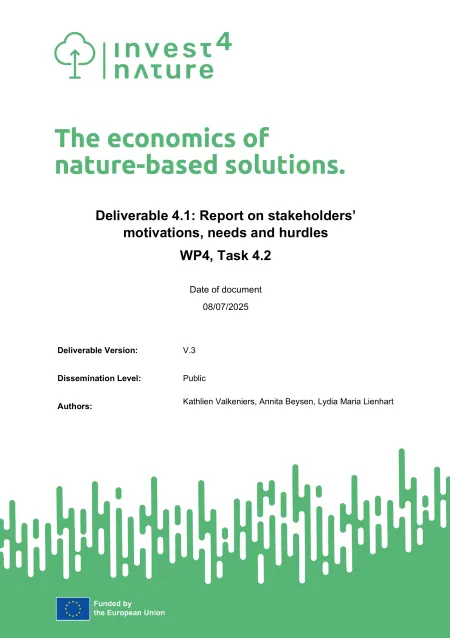
Resource description:
The Invest4Nature (I4N) project acknowledges the pivotal role of Nature-based Solutions (NbS) and robust sustainability practices in advancing Europe’s transition towards a climate-resilient and sustainable future. While NbS offer significant potential for addressing environmental and societal challenges, their widespread adoption within the private sector remains limited.
Against this backdrop, the European Union’s Corporate Sustainability Reporting Directive (CSRD) introduces new requirements aimed at enhancing transparency, accountability, and comparability in corporate sustainability performance.
This report investigates the main challenges, needs, and motivations of businesses as they navigate the evolving landscape of sustainability regulation and seek to integrate NbS into their strategies. By examining the experiences of companies across diverse sectors and European regions, the study aims to inform policy and practice on how to foster private investment in NbS and support businesses in meeting ambitious sustainability goals.
The report highlights that the concept of NbS lacks a unified definition, leading to uncertainty and difficulties in implementation. Many companies struggle to integrate NbS into their business models due to unclear financial benefits and difficulties in measuring environmental impact. There is a need for clearer guidelines and alignment with existing sustainability frameworks such as Environmental, Social and Governance (ESG) and the European Green Deal.
Companies engage in sustainability for reasons ranging from generational legacy and competitive advantage to regulatory compliance and stakeholder expectations. However, barriers such as high costs, uncertain return on investment (ROI), customer resistance to price increases, and skill shortages hinder effective implementation.
The CSRD expands sustainability reporting obligations, requiring detailed ESG-data disclosure. While this enhances transparency and reduces greenwashing, it also places significant financial and administrative burdens on companies, particularly small and medium enterprises (SME). Challenges include excessive bureaucracy, difficulties in data collection, inconsistencies across EU member states, and concerns about competitiveness against non-EU firms.
Despite recognizing the importance of sustainability, businesses prioritize financial health over funding green initiatives. Many feel that EU regulations hinder innovation and economic growth. They advocate for streamlined regulations, harmonization across member states, and incentives such as tax benefits for sustainable investments. While sustainability is a key priority, businesses demand a more flexible, incentive-driven framework to engage effectively in green practices while maintaining competitiveness.
Policymakers must therefore clarify NbS definitions, support SMEs in compliance efforts, simplify sustainability reporting, and encourage collaboration between the EU and corporations. Providing financial incentives and fostering innovation will ensure a balanced approach that aligns economic viability with environmental goals.
This work has been funded by the European Union under the Horizon Europe grant 101061083 (Invest4Nature). Views and opinions expressed are however those of the author(s) only and do not necessarily reflect those of the European Union or the European Commission and its European Research Executive Agency (REA) – hereinafter referred to as the granting authority. Neither the European Union nor the granting authority can be held responsible for them.
Author/Contact:
Kathlien Valkeniers, Annita Beysen, Lydia Maria Lienhart
Constraints:
- This version has been submitted to the European Commission / its Executive Agency and is currently under review.